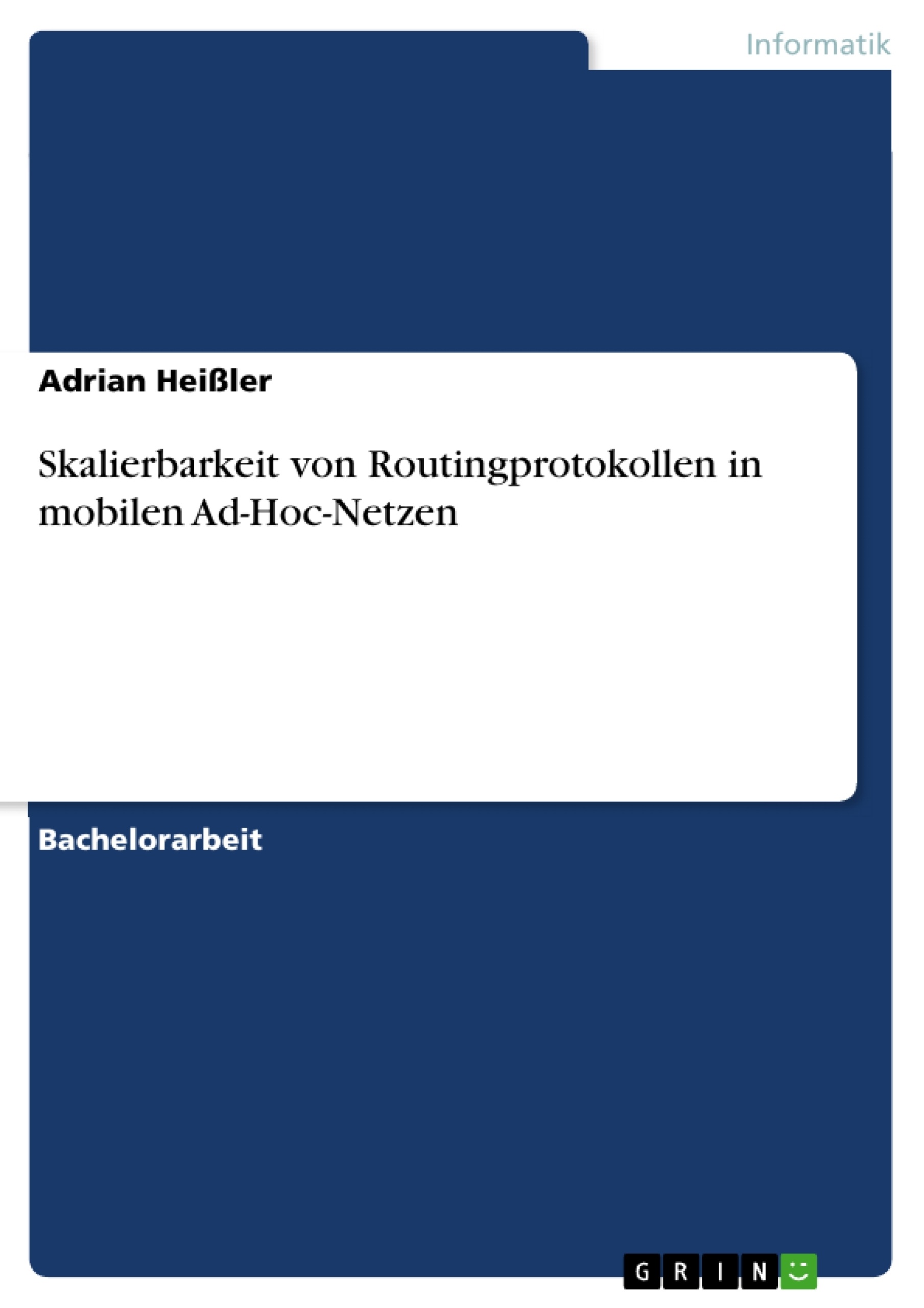Mobile ad hoc networks (MANETs) are networks of wireless mobile nodes without fixed infrastructure. Due to the highly dynamic topology there are special demands for routing protocols. Many routing protocols for MANETs have been proposed.
This paper deals with both a classification of MANET routing protocols and a review of the protocols AODV, OLSR, CBRP, FSR, ZRP and GPSR. Some results are presented, derived from the extended simulations that have been performed with the NS-2 network simulator, in order to compare the efficiency of the above protocols with respect to Paket Delivery Ratio, Average End-to-End Delay, Path Optimality and Throughput. Simulation
results show that in terms of Paket Delivery Ratio and Throughput most protocols perform worse in larger networks with many nodes than in smaller ones with less nodes.
Inhaltsverzeichnis
- Problem- und Aufgabenstellung
- Einleitung
- Grundlagen
- Eigenschaften und Anwendungsgebiete von mobilen Ad-Hoc-Netzwerken
- Anforderungen an MANET-Routingprotokolle
- Klassifizierung von MANET-Routingprotokollen
- Ausgewählte Routingprotokolle für Mobile Ad-hoc-Netzwerke
- Optimized Link State Routing (OLSR)
- Ad Hoc On-Demand Distance-Vector (AODV)
- Zone Routing Protocol (ZRP)
- Fisheye State Routing (FSR)
- Cluster Based Routing Protocol (CBRP)
- Greedy Perimeter Stateless Routing (GPSR)
- Methodik
- Der Simulator NS-2
- Die Simulationsumgebung
- Verwendete Metriken
- Implementierung der Simulation
- Ergebnisse der Simulation
- Packet Delivery Ratio.
- Average End-to-End Delay
- Path Optimality.
- Throughput
- Fazit
- Abbildungs- und Tabellenverzeichnis
- Abkürzungsverzeichnis
- Literaturverzeichnis
Zielsetzung und Themenschwerpunkte
Die Bachelorarbeit befasst sich mit der Skalierbarkeit von Routingprotokollen in mobilen Ad-Hoc-Netzwerken (MANETs). Ziel ist es, verschiedene Routingansätze und ausgewählte MANET-Routingprotokolle zu analysieren und deren Leistung in unterschiedlichen Netzwerkgrößen und -lasten zu vergleichen.
- Klassifizierung von MANET-Routingprotokollen
- Analyse ausgewählter Routingprotokolle (AODV, OLSR, CBRP, FSR, ZRP, GPSR)
- Simulation und Leistungsvergleich der Protokolle in NS-2
- Bewertung der Skalierbarkeit der Protokolle in Bezug auf verschiedene Metriken (Zustellrate, Verzögerung, Pfadoptimalität, Durchsatz)
- Identifizierung von Herausforderungen und Optimierungspotenzialen für Routingprotokolle in MANETs
Zusammenfassung der Kapitel
Die Arbeit beginnt mit einer Einführung in die Thematik der mobilen Ad-Hoc-Netzwerke und deren Eigenschaften. Anschließend werden die Anforderungen an Routingprotokolle in MANETs erläutert und eine Klassifizierung der verschiedenen Routingansätze vorgestellt. Im nächsten Kapitel werden sechs ausgewählte MANET-Routingprotokolle (AODV, OLSR, CBRP, FSR, ZRP, GPSR) detailliert beschrieben. Die Methodik der Arbeit umfasst die Simulation der Protokolle in der Netzwerksimulationssoftware NS-2. Die Simulationsumgebung und die verwendeten Metriken werden vorgestellt. Die Ergebnisse der Simulationen werden in Bezug auf die Metriken Zustellrate, Verzögerung, Pfadoptimalität und Durchsatz präsentiert und analysiert. Die Arbeit endet mit einem Fazit, das die wichtigsten Ergebnisse zusammenfasst und zukünftige Forschungsrichtungen aufzeigt.
Schlüsselwörter
Die Schlüsselwörter und Schwerpunktthemen des Textes umfassen mobile Ad-Hoc-Netzwerke, Routingprotokolle, Skalierbarkeit, Netzwerksimulation, NS-2, AODV, OLSR, CBRP, FSR, ZRP, GPSR, Zustellrate, Verzögerung, Pfadoptimalität, Durchsatz.
Häufig gestellte Fragen
Was sind Mobile Ad-Hoc-Netzwerke (MANETs)?
MANETs sind drahtlose Netzwerke aus mobilen Knoten, die ohne eine feste Infrastruktur (wie Router oder Basisstationen) funktionieren.
Was bedeutet Skalierbarkeit bei Routingprotokollen?
Skalierbarkeit beschreibt die Fähigkeit eines Protokolls, auch bei einer stark steigenden Anzahl von Knoten und hoher Netzlast effizient zu arbeiten.
Was ist der Unterschied zwischen AODV und OLSR?
AODV ist ein reaktives Protokoll (Route wird nur bei Bedarf gesucht), während OLSR ein proaktives Protokoll ist (Routen werden ständig aktuell gehalten).
Welche Metriken werden zur Leistungsbewertung genutzt?
Wichtige Metriken sind die Packet Delivery Ratio (Zustellrate), der Average End-to-End Delay (Verzögerung) und der Durchsatz (Throughput).
Warum sinkt die Leistung in größeren MANETs oft ab?
Mit mehr Knoten steigt der Verwaltungsaufwand (Overhead) für die Routenfindung, was zu mehr Kollisionen und längeren Verzögerungen führt.
Was ist der NS-2 Simulator?
NS-2 ist eine weit verbreitete Software zur Netzwerksimulation, mit der das Verhalten von Protokollen in komplexen Szenarien getestet werden kann.
- Quote paper
- Adrian Heißler (Author), 2008, Skalierbarkeit von Routingprotokollen in mobilen Ad-Hoc-Netzen, Munich, GRIN Verlag, https://www.hausarbeiten.de/document/151750


